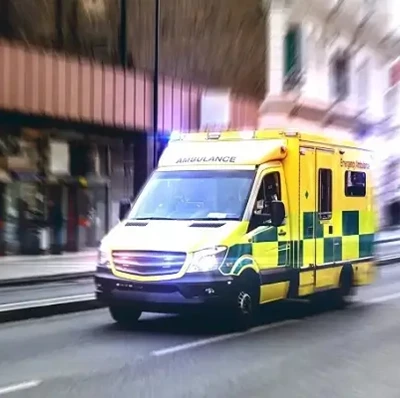Ambulance Insurance
We can offer emergency vehicle cover for a wide range of uses.
- Ambulance insurance for single vehicles or fleets
- Longstanding relationships with some of the largest companies in the ambulance insurance market
- UK-based support

One of the UK's leading independent insurance brokers
Why choose ambulance insurance with Towergate?

Wide range of cover available
We can cover a range of green light vehicles for the health sector including cover for vehicles used by doctors for emergency calls

Quick ambulance insurance quotes
Friendly advisers on-hand to help get you the right quote quickly

Panel of commercial ambulance insurers
Access to specialist ambulance insurers

Pay for your ambulance insurance by Direct Debit
You can choose to pay your ambulance insurance in 10 monthly Direct Debit instalments
About ambulance insurance

Ambulance and private ambulance insurance
We can cover vehicles used for charity groups, patient transport and special events; black ambulances used by funeral homes; and St John's Ambulances.

Affordable ambulance insurance
We have developed longstanding relationships with some of the largest companies in the market, including Aviva, AXA, Ageas, LV and NIG, in order to continue to provide affordable van insurance policies.

Ambulance insurance tailored for you
Our panel of insurers means we can compare multiple options, saving you time and money by avoiding you having to ring round individual insurance companies.

Other emergency vehicle insurance
We can also cover:
- Blood and organ transportation insurance – vehicles used for the delivery and collection of blood products and organs to and from hospitals and medical centres.
- Mobile health centre vehicles insurance – vehicles modified to carry out medical and health services in the community such as mobile scanning vehicles, trucks converted for patient care.
- Rescue vehicle insurance – vehicles used in rescue of the public these include vehicles used by the coastguard and mountain rescue
- Paramedic and GP fast response vehicles insurance – green light vehicles used for fast response to patients
When you need to make a claim, we'll guide you through the process and get your claim settled as quickly as possible.
- Find your insurance documents and make sure you have all your information at hand, including your policy number.
- Call the claims team on 0344 892 1434 and explain exactly what happened.
- Provide photos if requested to help us understand what happened as quickly as we can.

Ready to get covered?
- Fill in our online quote form or call us
- Purchase your policy
- Relax - You're covered!
Ambulance insurance FAQs
This is the first part of each claim which you (not your insurer) are responsible and must pay. There are two types of excess:
Compulsory excess - This is an excess that has been applied as a requirement by your insurer and will vary according to your personal circumstances and the terms of cover provided. A compulsory excess may be required if you drive a particular type of vehicle or you have inexperienced drivers on your policy.
A compulsory excess will apply to all damage claims including fire, malicious damage, theft and windscreen claims.
Voluntary excess - You can increase the amount of your voluntary excess and reduce the premium. This will apply in addition to the compulsory excess under the policy. You can ask for a variety of voluntary excesses to suit you when discussing your quotation.
A fault claim is recorded when an accident is either:
- The driver’s fault
- Not the driver’s fault, but the cost can’t be claimed from another party – for example if a parked van is hit and the other driver cannot be found, is vandalised, stolen or catches fire.
If your insurer pays for your damages in a claim, for example where a third party hit you, but then recovers their costs via the third party's insurer, this would be recorded as a non-fault claim as your insurer was not liable.
Yes, you must tell your insurer of any incident the insured vehicle is involved in, so that your file is always fully updated, even if no claim is to be made.
An electronic immobiliser is a device fitted to the vehicle that disables the engine of your vehicle when it is not in operation by you. Many newer vehicles have these factory fitted by the manufacturer and are normally shown within your vehicle brochure. It is also possible to have these fitted by a garage or specialist, who would supply a certificate of installation detailing the exact model of your vehicle's immobiliser. A copy of your fitment certificate may be required.
A manual immobiliser is a device which is usually placed on the steering wheel or gear lever of your vehicle.
There are two types of Thatcham graded immobiliser:
- Thatcham Category 1 = A combined alarm/immobiliser for a motor vehicle including perimeter, movement and internal ignition detection. A siren powered by its own battery supply will sound off if the vehicle is broken into.
- Thatcham Category 2 = An immobiliser only unit complying to Thatcham criteria.
* Who are Thatcham? Officially known as the Motor Insurance Repair Research Centre (MIRRC) established in 1969 by the motor insurance industry, have been at the forefront of vehicle safety, repair and security for many years. Since the 1990s The Thatcham Categories for Immobilisers and Alarms have set the benchmark for the motor industry. After research by Thatcham engineers, security devices can achieve Thatcham Security Certification after assessment of their features and performance. Appropriately assessed devices can then meet Thatcham Security Certification
If you prefer to spread the cost of your annual premium, we offer a quick and easy direct debit scheme. When you choose to pay premiums in instalments, you will be paying under a Premium Finance plan. We will give you full details of the finance provider, and the additional cost of finance, when we provide you with your payment plan quotation. This will include the total payable, the number of monthly instalments and the cost of each, as well as the representative APR.
If you would like to know more about our monthly payment option, please visit our dedicated direct debit page.
If you want to know more about our monthly payment option, please read our dedicated page on Direct Debit.
Please see your policy documents for full details of any exclusions.
See our range of commercial vehicle insurance covers
Read ambulance insurance articles
30/05/2024
Vehicle Safety Features to Reduce Your Insurance Costs
Keeping drivers safe and insurance claims down is increasingly vital for transport operators. See how new commercial vehicle safety features can help.
Read more05/07/2024
Reduce the Risk: Occupational Road Safety for Your Vehicles
Learn how to create the right occupational road safety culture to ensure your fleet stays on the road - and reduce your transport insurance costs at the same time.
Read more14/05/2019
State-Backed Medical Indemnity Scheme: What Does It Mean for Your GPs?
Find out how the state-backed medical indemnity scheme will affect your medical insurance.
Read more




